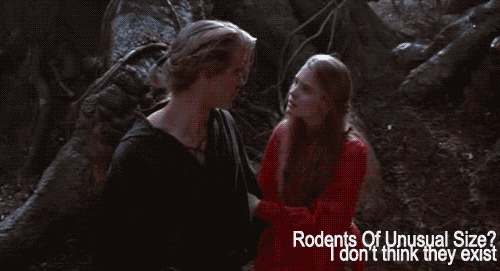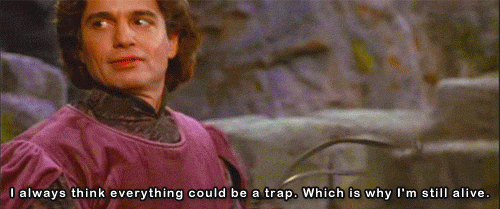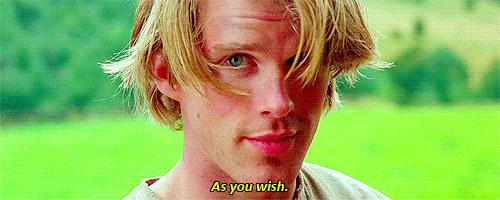***
But what if the change is hard? Or scary? Try looking at the idea through the lens of William Goldman's adventure book, The Princess Bride.
For some teachers, board members, and community stakeholders, doing multiple things in a classroom at once, learning from coursework online, trusting students to take charge of their learning, and even moving out of rows of desks is simply:
It's as unfamiliar as the setting of a fairy tale.
It's as frightening as a R.O.U.S. in the Fire Swamp.
When I think of paradigm in my own teaching career, I remember several moments of fear. But one stands out when I think of the transition to badges and online learning.
* * *
I had moved to a new district, teaching physics and other subjects. My style was much different from the predecessor, especially my insistence on teaching and learning using an extended 5E learning cycle. My students were building bridges, creating catapults, and studying modern physics using concepts gleaned from Quarknet project. I felt good about what I was doing.
That next fall, the TAG teacher informed me that she had a student who would be taking AP Physics online through Belin-Blank. Nothing personal, she informed me, but this student just felt it would be a deeper and more valuable experience.
Immediately, I sensed a trap.
My first reaction: fear.
What did that mean for my classroom? Were kids going to leave my room in droves, opting for online formats? What should I do if the kid came and asked me for help? After all, this wasn't even my student. What, wasn't I good enough to teach that kid? I felt like overreacting. Or, in Princess Bride dialogue,
“My name is Inigo Montoya, you killed my father, prepare to die!”
My second reaction: challenge.
It was (and is) my responsibility to reach as many kids as possible. Perhaps that AP student needed a faster pace. Or was a mathematical genius. Perhaps there was a reason that this student wasn't taking my class and I could learn from it. I talked to the TAG teacher; I started asking my own students what worked and didn't work in my classroom through conversations and evaluation. And I got better. In fact, I think that experience motivated me in ways that no traditional evaluation could have ever done. It was a defining moment in my teaching. “Now what happens?" asked the man in black.
"We face each other as God intended," Fezzik said. "No tricks, no weapons, skill against skill alone.""You mean you'll put down your rock and I'll put down my sword and we'll try to kill each other like civilized people, is that it?”
My third reaction: acceptance of differentiation.
This took time. The fact is, kids learn in different ways. Some need one-on-one guidance and tutoring. Others have social needs and want my classroom experience as much for the people as for the learning. Some students need an instructional coach but can learn online by reading, using an open-source textbook or a website like physicsclassroom.com.
Here is the reality. Unless kids WANT to learn from us, and value the content we offer, they can tune us out. And then no amount of cajoling and threatening will help them learn. It takes relationship, not a permissive environment of do-and-don't , regardless if the learning is taking place online, face-to-face, or in a community setting.
“I am your Prince and you will marry me," Humperdinck said.
Buttercup whispered, "I am your servant and I refuse.""I am you Prince and you cannot refuse."
"I am your loyal servant and I just did."
I didn't enter education to be the know-it-all on the block. I no longer worry about the kids who don't take my classes--instead, I help those who ask for help and look for knowledge sources, regardless of the classes they are taking. That is real teaching. That is real advocacy for life-long learning. And it's probably as close as we will ever come to the statement of love that Wesley, the farm hand, offers freely:
Because life is not a fairy tale. As William Goldman says:
“I’ll tell you the truth and its up to you to live with it.”





I applaud you for working past your initial (and understandable) fear and realizing that any given student's choice does not reflect your success or aptitude as a teacher.
ReplyDeleteDuring my school years, one of the hardest lessons to learn was that my teachers (and other adults) were just as susceptible to petty feelings/actions and other human weaknesses as my adolescent peers. Obviously, now that I've had a few more years under my belt (and am investigating schools for my own kids - hard to believe!), I'm fully aware that teachers are only human, and some are better at their jobs than others, but at the time it was a real shock and disappointment to learn that I was occasionally more "mature" in my responses than my teacher.
I went through a similar experience from the student's perspective (though with a more conventional teaching approach). After one year of a subject where I learned nothing in the classroom except how to tutor my classmates and burn paper on the radiators at the back of the room, my parents suggested I consider an independent study course through an outside service as an alternative to continued classroom work with the same teacher. It turned out to be a better match (though I admittedly alternately slacked and crammed), and I did well and retained the materials better. However, I had not anticipated the classroom teacher taking my exit from his classroom as a personal insult, and to be both treated rudely and excluded from student organizations by him as a result. In the grand scheme, I learned a few life lessons about politics and people, but it still saddens me slightly that at 13 I had to understand and then accept that my teacher was holding a petty grudge, and there was nothing I could do about it.
I have some great memories of your classroom, not least because you generally placed yourself closer to "peer" status than the traditional teacher/student roles. And I think your willingness to understand that a few students may not match well with your dynamic is another marker of your excellence as a teacher.
I love to see your updates of the fun stuff your students are still doing! And I still remember measuring the speed at which Wile E. Coyote fell off a cliff, 15 years later!